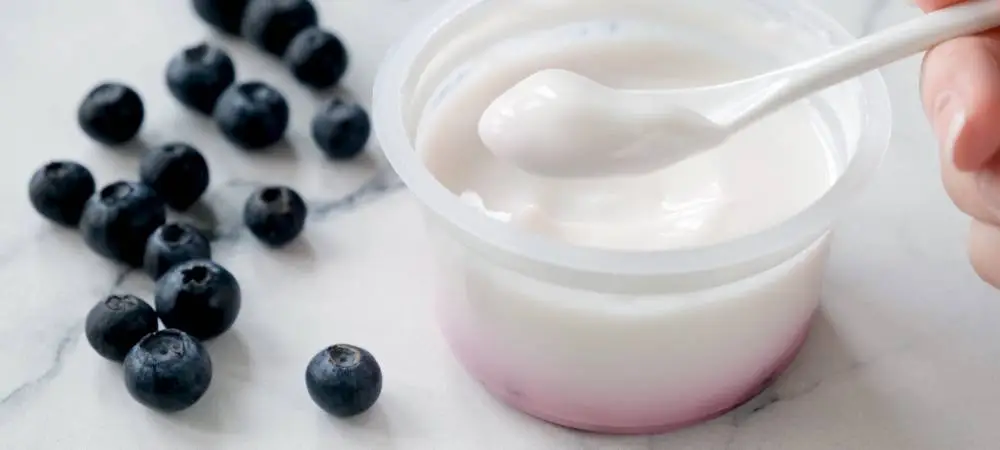Greek yogurt has become very popular over the years. It is full of protein and calcium, making it a great food for athletes and those who want to build muscle mass.
Yogurt is a fermented dairy product that is loved worldwide for its delectable taste. Among different varieties of yogurt, Greek Yogurt is getting incredibly popular for its amazing health benefits.
Many theories are prevailing on the internet about the origin of the Greek Yogurt.
One of the theories says, while the name Greek Yogurt often confuses its origin from Greece, the staining of Yogurt began in the Middle East. Some records suggest the origin of greek yogurt in the 5th century BCE as Yiatourti – a Mediterranean-style yogurt.
| According to Chobani Founder Hamidi, “As a Greek Company introduced the Greek yogurt in the USA, it started name as Greek Yogurt.” |
Another theory confirms that Traditional Greek Yogurt is made of pure sheep milk strained in a muslin cloth to get a thicker yogurt consistency.
| According to Quora users, “Greek Yogurt is a marketing name for a strained yogurt.” |
So, What is Greek Yogurt?
Greek Yogurt is also known as strained yogurt. When the regular yogurt is strained to remove the whey, the left-out yogurt refers to the Greek yogurt, which has a thicker consistency. It is also rich in protein and calcium. The whey removal reduces the number of carbs in it.
The result is very thick and tangy, making it perfect for snacking. Since it contains less water than regular yogurt, it costs more per serving.
The Process of making Greek Yogurt is similar to that of regular yogurt. But there is one added step of straining it through the mesh cloth.
Greek yogurt is made by taking regular yogurt and removing the liquid. It means you need more milk to get the same amount of yogurt.
To produce one cup of Greek-style yogurt requires about 4 cups of regular yogurt. As a result, you will need to buy more milk to make 1 cup of Greek-style yogurt.
Store-Bought Greek Yogurt Vs. Homemade Greek Yogurt
Homemade Greek Yogurt is easy to prepare and gives you complete control over the ingredients. Often store-bought yogurts use thickeners and additives to obtain a thicker texture.
Store-bought Yogurt is generally more expensive than Homemade ones. You can considerably save 15-20 cents for each batch by preparing it at home. ‘
Greek Yogurt Nutrition
Coming to Greek Yogurt nutrition, as we know that Greek yogurt is a protein-dense yogurt, it has high nutritional value than regular yogurt. Every serving of greek yogurt comes with 17 grams of protein and 5 grams of Calcium.
Under Greek Yogurt Vs Regular Yogurt Analysis, Greek Yogurt contains half the carbs and sugar as that Regular yogurt but double the amount of protein in any regular yogurt.
This difference in nutritional value is attributed to the straining process leading to whey removal.
Is Greek Yogurt Suitable for people with lactose intolerance?
Greek Yogurt is Naturally Low in Lactose Content. Most people experience diarrhea, bloating, and nausea if they consume dairy products. It is due to their intolerance to the lactose present in dairy. But yogurt comes with probiotics that aid lactose digestion.
Coming to Greek Yogurt, it is high in probiotics and low in lactose, making it easier to digest for people with lactose intolerance. As greek yogurt aids the microbiome in your gut, studies show a balanced gut microbiome strengthens your immune system and protects against various allergies such as bloating, diarrhea, etc.
How Long Does Greek Yogurt Last?
Greek yogurt can last up to 14 days. Do you know that even the yogurt can last past its expiration? Although opened, Greek Yogurt has a lower shelf life. It is important to store your Greek yogurt properly to avoid spoiling.
Can I freeze Greek Yogurt?
Frozen Greek Yogurt is a popular recipe that can replace high-calorie ice-creams. Freezing Greek Yogurt directly is not recommended as it will separate the liquid from curd, impacting its taste adversely.
Is Greek Yogurt Simple Indian Dahi?
While Greek Yogurt and Indian Dahi come with almost the same texture and appearance, there is a slight difference in the bacterial profile. While the former comprises lactobacillus and streptococcus, Dahi has one bacterial strain: lactobacillus.
How to Sweeten Greek Yogurt?
As the typical greek yogurt is tart with taste, adding the sweeteners such as honey, maple syrup, fruit puree, stevia, etc., can enhance its taste. There are many ways you can make the greek yogurt taste good.
What are the health benefits of Greek Yogurt?
There are many health benefits of consuming greek yogurt regularly. Here we have listed some of them:
1) Healthy Weight Loss:
Yogurt helps in weight loss because of its high protein. According to a study published in the Journal of Obesity, there is evidence that shows a correlation between lower BMI and yogurt consumption.
2) Digestive Health:
Yogurt improves the digestive tract by increasing the good bacteria in your body. The healthy bacteria in your gut help break down food into nutrients that your body gets absorbed. It also reduces gas production and bloating.
3) Immunity Booster:
It boosts immunity by providing necessary vitamins and minerals. A study on mice showed that eating yogurt increased the number of T cells in their body. These cells play a vital role in fighting infections and diseases.
4) Heart Disease Prevention:
Research confirmed that those who ate more than two cups of yogurt per week were less likely to suffer from heart disease. They had lower cholesterol levels and better blood pressure compared to those who did not eat yogurt.
5) Anti-Aging:
A study published says that yogurt may slow down aging by reducing inflammation. It is abundant in vitamins, calcium, probiotics, and zinc B.
6) Cancer prevention:
According to a study published in Nutrients, consuming yogurt containing live cultures was associated with reduced cancer risk. People who consumed yogurt every day had a 40% lesser chance of developing cancer compared to those who didn’t consume it at all.
7) Bone Health:
According to a study published in Nutrition Research, adults who consumed yogurt twice a week had higher bone density than those who did so once or never.
Is Greek Yogurt Bad For Cholesterol?
According to WebMD, Greek Yogurt helps lower the triglyceride and cholesterol levels in our body. Cholesterol and triglyceride are responsible for blocking the arteries, which lead to heart diseases. But eating greek yogurt in moderation helps in lowering cholesterol levels.
Greek Yogurt Recipes:
Many recipes use Greek yogurt as a primary ingredient to serve you with nutritional boost:
Greek Yogurt Smoothies
One of the healthiest recipes from greek yogurt one can think of is the Greek Yogurt Smoothies. There are a variety of combinations that one can consider ranging from mango smoothies, strawberries, blueberries smoothies, etc. Refer to our best greek yogurt smoothies blog to discover some of the amazing Greek Yogurt Smoothies recipes.
Marinate
Greek Yogurt is ideal for marinating the chicken and other meats along with spices to make them tender and full of flavors. When you roast them with greek yogurt dipping, it produces succulent and juicy roasted meat pieces.
Substitutions
You can substitute greek yogurt the high-calorie creme fraiche, sour creme, and mayos by substituting the same amount of greek yogurt. It will reduce your recipe’s calorie count while maintaining its flavors.
How to Make My Greek Yogurt Taste Good?
While we insist on eating plain greek yogurt to avoid any additive and fructose that may enhance the calorie count, it is always preferable to top it with some healthy options.
Seeds, Nuts, Granola, banana flakes, strawberries, honey, blueberries, etc., are some options that can make your greek yogurt taste good.
How Much Greek Yogurt Should I Eat?
The recommended serving is 6 ounces or 3/4 cup daily to get you the right nutrition. Choosing the right type of Greek Yogurt is equally important. Always consider low-fat Plain Greek Yogurt to avoid additives and other extra sugar content.
Conclusion:
Greek yogurt has been around since ancient times, but people gradually started understanding its relevance. It is a great protein, calcium, vitamin D, and probiotic source. There are number of ways to enjoy your Greek Yogurt – by adding into smoothies and recipes or top-it-up with your favourite toppings.
While some people believe that the Greek Yogurt is originated from Greece, many still believe that it is a medditerrean style yogurt. No matter how and where it is originated, today it is one of the sought after option among health freaks for its incredible health benefits.










